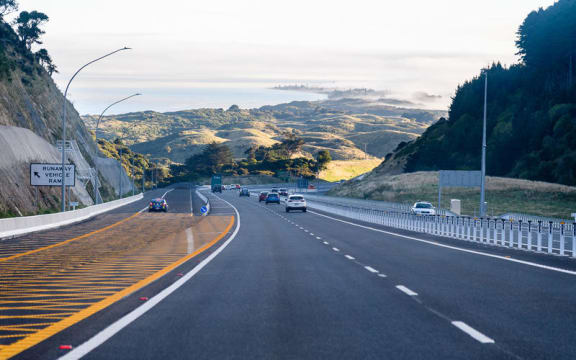‘We can’t buy our way out ‘ Chris Bishop on infrastructure funding and user-pays

The infrastructure minister wants more private sector financing, such as public-private partnerships (PPPs), to pay for major projects.
In a speech to Local government New Zealand on Thursday night, Chris Bishop said he wanted government grant funding to become a last resort for councils.
“My speech talks about some of the things we’ve been talking about as a government for six months, and we’ve actually campaigned on – so making greater use of tolls, public private partnerships, things like value capture as well,” he told Morning Report on Friday.
“The simple point is that we can’t buy our way out of our infrastructure deficit. It’s built up over many years. We do need to invest more obviously, but we also need to utilise what we’ve got and make better use of the existing assets, and so we need to invest in maintenance on our roads, for example.
“And you’ve seen Simeon Brown recently launch the Pothole Prevention Fund because we’ve been underinvesting in maintenance on our roads, and the speech signals that we’re looking at things like congestion pricing to make better use of the existing roads that we have around the country, and manage demand on our roads.

“That’s the point of the speech – to change some of the way we do things.”
Which would mean more user-pays.
“Infrastructure has to be paid for and at the moment, it’s largely paid for by the Crown – which is taxpayers – or it’s paid for by ratepayers. And what we’re saying is that user-pays has a role to play here as well. Things like water metres, things like congestion pricing in our major cities and things like toll roads.
“So for example, we’ve campaigned on and we’re going to build these new roads of national significance around the country. Our expectation is that all of those roads will be tolled, which means that there’s a revenue stream designed to support the investment in those roads.”
PPPs would definitely be a part of the mix, Bishop said, claiming the public generally only heard about poorly run PPPs with cost blowouts – not so much about the ones that work.
“Well, that’s about how you design the model and making sure that the risk-sharing framework means that when things do go wrong and it’s the fault of the person doing the delivery – the private provider in some cases – they bear the risk and the consequence of doing that. So it’s about how you design it…
“That’s why we’re not just rushing in and you know, signing contracts straight away. We’re taking the time to get the system right. We’re setting up a new National Infrastructure Agency. We’re building up the resource and the expertise inside the Crown. We’re modernising our framework. We’re refining the PPP model to make sure it’s world-class. So all that work’s underway right now.”
As for whether it would be more cost-effective for the Crown to fund infrastructure directly, considering its immense borrowing power, Bishop said the Crown “doesn’t have an unlimited balance sheet”.
“We’re not signalling that, you know, everything is going to be a PPP. But our point is that it needs to be part of the funding mix… The projects that we do build, we’ll be looking at PPPs as part of that.”
As for offshore investment, Bishop said the plan was to be “country agnostic” and not rely mostly on the likes of China.
“There are pension funds overseas. That’s more what we’re talking about. If you think about what happened in the last Labour government, they were approached in an unsolicited way by the Canadian CDPQ, which is a pension fund out of Canada – those are the sort of private investors we’re talking about. Big pension funds overseas.
“But also frankly KiwiSaver providers here in New Zealand and the New Zealand Super Fund as well, because there’s a lot of capital tied up in savings by New Zealanders. And how good would it be if we saw capital, savings from New Zealanders, their retirement savings, invested in New Zealand infrastructure?
“So they get a return, a regular guaranteed rate of return flowing into their retirement bank accounts – so that means every time you potentially drive a toll road around the country or you pay for a public transport project, for example, you’re helping to save for your retirement. I think that’d be pretty cool.”
Sharing GST
In March, Auckland Mayor Wayne Brown called on the government to return GST on council rates to help fund the region’s infrastructure.
The ACT Party has proposed sharing the GST take from a new house 50/50 with the council that approved the build.
ACT’s Housing Infrastructure (GST-sharing) Bill last year had support from every party in Parliament, except Labour, which had an outright majority so it did not pass.
Bishop said it was likely some kind of GST-sharing arrangement would happen eventually.
“We will be doing financial incentives for councils; precisely what that looks like, we’re just working our way through at the moment and we’re considering the ACT Party idea as part of that.
“Clearly it wasn’t in Budget 2024 but we are doing the work on that and it’s going to happen. It’s just a question of exactly what it looks like when it comes in and a bit of detail to work through. But we’re committed to doing that.”
According to the news on Radio New Zealand




